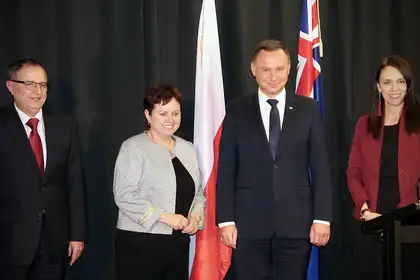
(from left) Professor Rouben Azizian with Vice-Chancellor Professor Jan Thomas, Polish President Andrzej Duda and New Zealand Prime Minister Jacinda Ardern at the Memorandum of Understanding signing ceremony in Auckland.
International security scholars at Massey University will have new opportunities for research collaboration on central European issues, thanks to a Memorandum of Understanding with Poland’s Jagiellonian University.
Vice-Chancellor Professor Jan Thomas signed the agreement on behalf of Massey’s Centre for Defence and Security Studies at a ceremony at Auckland’s Sky City yesterday attended by visiting Polish President Andrzej Duda and New Zealand Prime Minister Jacinda Ardern.
The relationship was facilitated and brokered by Polish ambassador Zbigniew Gniatkowski and Professor Rouben Azizian, director of Massey’s Centre for Defence and Security Studies, prior to the President’s four-day visit to New Zealand this week.
The focus of the relationship will be between Massey’s Centre for Defence and Security Studies and Jagiellonian University’s Department of National Security, Institute of Political Science and International Relations. Jagiellonian University, founded in 1364 by the Polish king, Casimir the Great, is located in Kraków, and is one of Poland’s top two universities.
The agreement represents a new and exciting relationship, says Professor Azizian. “As well as integrated perspectives on the development-security nexus, this relationship offers excellent potential for future collaboration on international security and defence research and scholarship, offering access to Central European insights and perspectives,” he says.
“This might be considered especially useful given growing regional tensions, the increase in global strategic competition, and uncertainty associated with the evolution of the North Atlantic Treaty Organisation [NATO].”
Poland’s role as a European Union member is increasingly important, he says, and both New Zealand and Poland share similar concerns about the growing strategic influence of China and Russia in their respective geopolitical spheres.
In her speech Prime Minister Jacinda Ardern highlighted the historic and humanitarian ties between New Zealand and Poland – in 1944 the New Zealand government welcomed over 700 Polish children orphaned in WW II, setting up an internment camp in Pahiatua.
Professor Azizian says the Polish president expressed a wish during his speech at the signing for more Polish university students to undertake study and cultural exchanges in New Zealand, as well as for increased tourism between the two nations.